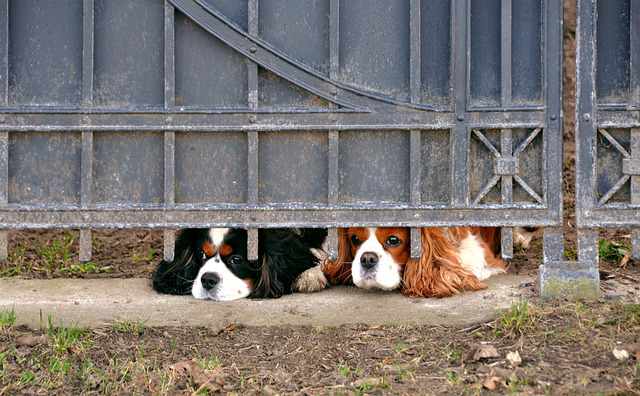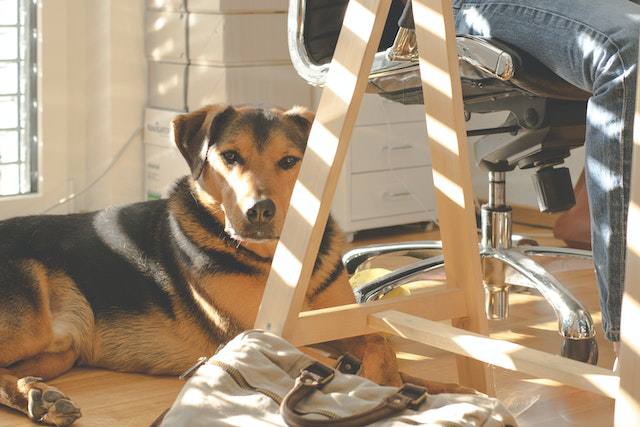Let’s talk about a topic that’s been wagging its tail in the dog world – boredom in dogs.
We all know that our pups deserve the best, so join me as we dive into the signs, solutions, and secrets to keeping our four-legged companions entertained and tail-waggingly happy!
So, grab a treat, settle in, and let’s unleash the fun! We’ll cover the signs, causes, and how to fix boredom as well as ways of preventing boredom in dogs… Let’s get started!
What is Boredom in Dogs
Boredom in dogs refers to a state of restlessness or dissatisfaction resulting from a lack of mental or physical stimulation.
Dogs may exhibit behaviors such as excessive barking, chewing, digging, or pacing when they are bored.
Providing adequate exercise, mental stimulation, and interactive toys can help alleviate boredom in dogs.
It is important for dog owners to engage in regular playtime and training sessions to keep their dogs mentally and physically stimulated
Effects of Boredom on Dogs
Boredom can have negative effects on dogs both mentally and physically. Dogs who experience chronic boredom may develop behavioral problems such as excessive barking, chewing, or digging.
They may also exhibit signs of restlessness or anxiety. In addition, boredom can lead to weight gain or obesity in dogs due to reduced physical activity.
Lack of mental stimulation can also result in a decline in a dog’s overall well-being and quality of life.
Signs of Boredom in Dogs

Boredom in dogs can be detrimental to their mental and physical well-being. Recognizing the signs of boredom is crucial for addressing the issue and providing appropriate stimulation for your furry friend.
Here are some of the major signs of boredom in dogs:
1. Destructive behavior: Dogs may engage in destructive behaviors when they are bored, such as chewing furniture, shoes, or other household items. This behavior can be a result of trying to alleviate their boredom or frustration.
2. Excessive barking: Boredom can lead to excessive barking, as dogs may use vocalization as a way to express their frustration or seek attention. If your dog is barking excessively without an apparent reason, it could be a sign of boredom.
3. Restlessness and pacing: Dogs often exhibit restlessness and excessive pacing when they are bored. They may wander around the house or yard, unable to settle down or find something engaging to do.
4. Lack of interest in toys or activities: When a dog is bored, they may lose interest in their toys or usual activities. They may ignore their toys or play with them briefly before losing interest. This disinterest is a clear sign that they are not sufficiently stimulated.
5. Attention-seeking behavior: Bored dogs may resort to attention-seeking behaviors to alleviate their boredom. They may nudge you for attention, paw at you, or engage in other behaviors that aim to get your focus and interaction.
6. Increased sleeping: While dogs do sleep a fair amount, excessive sleeping can be a sign of boredom. If your dog is sleeping more than usual and lacks enthusiasm or energy when awake, it may indicate a lack of mental and physical stimulation.
7. Escaping or roaming behavior: Dogs that are bored may try to escape from their confinement or yard to seek more interesting stimuli. They may attempt to dig under fences, jump over obstacles, or find any opportunity to explore the surroundings in search of excitement.
If you notice these signs of boredom in your dog, it’s essential to provide them with appropriate mental and physical stimulation.
Engage them in interactive play sessions, provide puzzle toys, vary their daily routine, and consider activities like training, agility, or regular exercise to keep them mentally and physically engaged.
Causes of Boredom in Dogs

Boredom in dogs can lead to various behavioral issues, such as excessive barking, destructive chewing, and digging.
Understanding the causes of boredom can help dog owners address this issue and provide their furry friends with mental and physical stimulation.
Here are some of the major causes of boredom in dogs:
1. Lack of Mental Stimulation: Dogs are intelligent animals that require mental stimulation to stay engaged and avoid boredom. Without mental challenges, dogs may become restless and seek ways to entertain themselves, often resulting in destructive behaviors. Providing interactive toys, puzzle games, and training sessions can help keep their minds active and prevent boredom.
2. Insufficient Physical Exercise: Dogs are naturally active animals that require regular physical exercise to burn off excess energy. A lack of physical exercise can lead to boredom and restlessness. Daily walks, playtime, and engaging in activities such as fetch or agility training can help keep dogs physically stimulated and prevent boredom.
3. Lack of Social Interaction: Dogs are social animals that thrive on companionship and interaction with humans and other dogs. When left alone for long periods without social interaction, dogs can become bored and lonely. Providing quality time, socializing with other dogs, and considering doggy daycare or play dates can help alleviate boredom caused by social isolation.
4. Monotonous Environment: A monotonous and unstimulating environment can contribute to boredom in dogs. Dogs need a variety of sensory experiences and environmental enrichment to stay mentally engaged. Providing toys, rotating them regularly, introducing new scents, and creating different play areas can help prevent boredom by keeping the environment interesting and stimulating for dogs.
5. Lack of Training and Mental Challenges: Dogs enjoy learning and engaging in training activities. A lack of training and mental challenges can lead to boredom. Regular training sessions, teaching new tricks, and participating in canine sports or activities like nose work can provide mental stimulation and prevent boredom in dogs.
6. Separation Anxiety: Dogs with separation anxiety can experience boredom when left alone. Separation anxiety is a condition where dogs become anxious and distressed when separated from their owners. This anxiety can lead to boredom and destructive behaviors. Addressing separation anxiety through behavior modification techniques, gradual desensitization, and providing comforting items can help alleviate boredom caused by this condition.
7. Lack of Novelty and Variety: Dogs thrive on novelty and variety in their daily routines. A lack of new experiences and environmental changes can contribute to boredom. Introducing new toys, taking different routes during walks, and providing novel experiences like visits to new places or meeting new people can help prevent boredom by keeping things interesting for dogs.
8. Lack of Routine: Dogs are creatures of habit and thrive on a predictable routine. A lack of structure or inconsistent daily activities can lead to boredom and restlessness.
How to Stop Boredom in Dogs

To stop boredom in dogs, engage them in regular physical exercise to tire them out and stimulate their minds. Provide them with interactive toys that challenge their problem-solving skills.
Rotate their toys regularly to keep them interested. Teach them new tricks or commands to keep their minds engaged.
Consider enrolling them in obedience training or dog sports to provide mental stimulation and socialization. Create a structured daily routine with set feeding times, walks, and playtime to give them a sense of predictability.
Lastly, spend quality time with your dog, giving them attention, affection, and interactive play to strengthen the bond between you.
Preventing Boredom in Dogs
To prevent boredom in dogs, it is important to provide them with mental and physical stimulation.
Regular exercise, such as daily walks or playtime, helps to release excess energy and keeps them physically fit.
Engage in interactive games like fetch or hide-and-seek to stimulate their minds. Puzzle toys and treat-dispensing toys can keep them occupied and mentally stimulated.
Rotate their toys regularly to keep them interested and avoid monotony. Provide them with opportunities to socialize with other dogs through supervised playdates or visits to dog parks.
Teaching them new tricks and commands not only keeps them mentally engaged but also strengthens the bond between you and your dog.
Lastly, consider enrolling your dog in training classes or activities like agility or obedience to challenge their skills and keep them mentally stimulated.
How to Entertain a Bored Dog

To entertain a bored dog, you can start by providing them with interactive toys or puzzle games that stimulate their mind and keep them engaged.
You can also engage in active play with your dog, such as playing fetch or tug-of-war, to expend their energy and provide mental stimulation.
Taking your dog for regular walks or runs can also help alleviate boredom and provide them with new sights and smells.
Additionally, teaching your dog new tricks or commands through positive reinforcement training can be mentally stimulating and entertaining for both of you.
Consider introducing your dog to new environments or socializing them with other dogs to keep them mentally and socially stimulated.
Finally, providing your dog with safe chew toys or bones can help keep them occupied and entertained, especially when you’re not available to interact with them directly.
Frequently Asked Questions
Why is it important to address boredom in dogs?
Addressing boredom in dogs is crucial because it can lead to behavioral issues and affect their overall well-being. Boredom can cause destructive behavior, excessive barking, and even aggression. Keeping our furry friends mentally stimulated and engaged is vital for their happiness and a harmonious household.
How can I tell if my dog is bored?
Dogs can exhibit various signs of boredom, such as excessive chewing, digging, or scratching furniture. They may also become restless, excessively bark, or engage in attention-seeking behaviors. If your dog seems disinterested in toys or lacks enthusiasm during walks, it could be a sign of boredom.
What are some activities to combat boredom in dogs?
There are numerous activities you can try to keep your dog entertained and mentally stimulated. Interactive toys, puzzle feeders, and treat-dispensing toys are great options. Engaging dogs in regular exercise, obedience training, and teaching new tricks also help. Additionally, providing your dog with socialization opportunities and playdates can alleviate boredom.
How much exercise does a bored dog need?
The exercise needs of a bored dog can vary depending on their breed, age, and overall health. However, as a general guideline, dogs should engage in at least 30 minutes to two hours of physical activity every day. Regular walks, playtime, and interactive games should be part of their routine to keep them physically and mentally stimulated.
Can leave the TV or radio on help with dog boredom?
Yes, leaving the TV or radio on can provide some auditory stimulation and make your dog feel less alone. The sounds and voices can help create a sense of company and prevent them from becoming bored, especially when they are left alone for extended periods. However, it is essential to choose pet-friendly programs or soothing music to avoid agitating or confusing your furry friend.
Are there any long-term effects of chronic boredom in dogs?
Chronic boredom can have detrimental effects on a dog’s overall behavior and well-being. It can lead to increased anxiety, depression, and even health issues like obesity. Additionally, dogs that are constantly bored may develop destructive habits that can be challenging to break. It’s crucial to address boredom promptly to ensure the long-term happiness and health of your furry companion.
Conclusion
In conclusion, boredom in dogs is a real concern that requires our attention. By understanding their needs, providing mental stimulation, and engaging in interactive play, we can keep our furry friends happy and fulfilled. Remember, a happy dog is a healthy dog, so let’s make sure they never have a dull moment!


